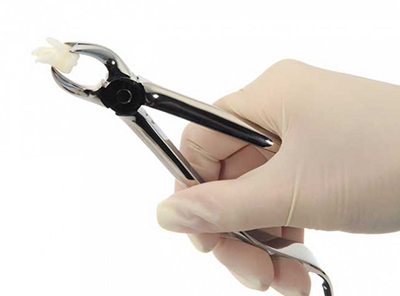
Source: www.affinitydentalclinics.com
There are a number of reasons why your dentist might recommend a tooth extraction. Common reasons include tooth decay, trauma or crowding. Once you have had a tooth extracted, you need to think about aftercare for the procedure which may help you feel better and speed up healing. Here are some tips to make recovery easier:
Bleeding Control
After the tooth is removed, your dentist will immediately place a gauze pad for you to bite on. Bite or hold the gauze pad firmly in place for approximately one hour and replace every 30-45 minute depending on the extent of the bleed. If the bleeding continues, do not worry, a minor amount of bleeding is normal and may appear worse than it is because it will be mixed with a large amount of saliva. What you can do however, is moisten a tea bag with water, fold it in half and bite down on it for 30 minutes. The tannic acid in black tea will help stop the bleed. However, if the bleeding is heavy and persists for an hour or two, contact your dentist. Once the bleeding subsides, a blood clot will form. It is important not to disturb or dislodge the blood clot as it aids healing.
Pain and infection control
After the tooth is extracted, you may feel some pain. Take the first dose before the numbness has worn off after the extraction. If antibiotics are prescribed, continue to take them exactly as directed, even if signs and symptoms of infection are gone.
Minimising swelling
You may experience some swelling after the tooth is extracted. Following the extraction, apply an ice pack on your jaw, on the side of the extraction for 20 minutes and off for 20 minutes, alternating for the first 24 hours. After 48 hours you may apply a warm compress to increase circulation and promote healing. Usually, swellings subside after 48 hours.
Diet
Approximately 2 hours after the procedure, the numbness will wear off and you can resume eating and drinking. However, during the first two days, your diet should consist of liquids, and soft foods. During this time, chew food on the unaffected side, try to eat cold food or food at room temperature and drink plenty of fluids. Avoid spicy food, hot drinks, and carbonated drinks for 3 to 4days, to prevent irritation and burns. If many teeth have been extracted, drink at least six glasses of liquid on the first day to compensate for the amount of blood lost.
Oral hygiene
When brushing your teeth, brush gently near the extraction site. Other areas can be brushed normally. Remember to not poke at the extraction site with your fingers and keep your tongue away from this area to avoid dislodging the clot, as this which will retard the healing process.
The first day after the extraction, rinse your mouth gently with warm salt water (1 teaspoon of salt in a glass of warm water) after each meal if possible. Rinsing your mouth this way will help flush out particles of food and debris that may lodge in the extraction site, helping promote healing and reduce your chances of getting an infection.
WARNING: Do not rinse vigorously and do not spit out forcefully!
Don’t smoke and avoid alcohol
Post extraction, do not smoke for a minimum of two days as it interferes with the healing process. The sucking motion of ciggarette smoking could dislodge the blood clot, causing a painful tooth socket. Alcohol should also be avoided for 24 hours, as it can delay the healing process.
Blowing your nose
If you had your upper back teeth removed, you may not blow your nose for 2 to 3 days. Blowing your nose or sneezing violently can dislodge the blood clot and impair healing. Should you have an upper respiratory tract infection or suffer allergies, ensure you have the appropriate sinus medication.
Sharp edge of the socket
As our gums tighten up faster than our bones heal, you may feel the sharp edge of the socket with your tongue. Sometimes, little bits of bone may make their way to the surface and work their way out of the wound. Although this is perfectly normal and harmless, you can ask your dentist to remove it for you if you find it annoying and you do not want to wait for it to come out by itself.
Stitches
Should you require stitches, they may need to be removed by your dentist or they may dissolve after a week or two. Your dental surgeon will advise you on this.
Rest as needed
Avoid excess exercise or heavy lifting for at least one to two days after an extraction. The physical exertion will get the blood pumping, increase your heart rate and prolong bleeding. Rest during the day and go to bed early. When lying down, elevate your head slightly on two pillows or sit in a semi-reclined position for the first evening.
Should you have any of the following issues, contact/see your dentist immediately.
- Pain becomes more severe the day after your extraction
- Heavy bleeding and difficult to control
- Swelling around the extraction site worsens
- Itching or rashes occur after you take medication
Dr. Marini Ismail is a dental officer currently working in Selangor.
References
- Watson S. 6 Steps to Recovery After Oral Surgery [Internet]. About.com Health. 2015 [cited 21 February 2015]
- Chestnutt I, Gibson J. Churchill’s pocketbook of clinical dentistry. Edinburgh: Churchill Livingstone; 2002
[This article belongs to The Malaysian Medical Gazette. Any republication (online or offline) without written permission from The Malaysian Medical Gazette is prohibited.]
